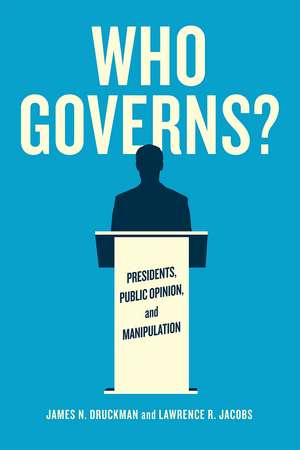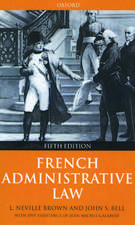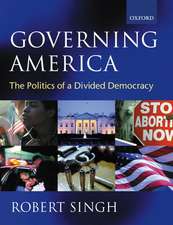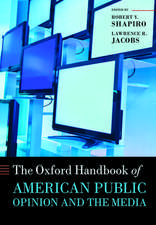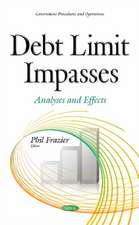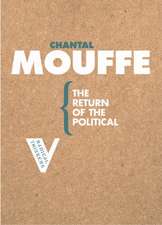Who Governs?: Presidents, Public Opinion, and Manipulation: Chicago Studies in American Politics
Autor James N. Druckman, Lawrence R. Jacobsen Limba Engleză Paperback – 18 mar 2015
America’s model of representational government rests on the premise that elected officials respond to the opinions of citizens. This is a myth, however, not a reality, according to James N. Druckman and Lawrence R. Jacobs. In Who Governs?, Druckman and Jacobs combine existing research with novel data from US presidential archives to show that presidents make policy by largely ignoring the views of most citizens in favor of affluent and well-connected political insiders. Presidents treat the public as pliable, priming it to focus on personality traits and often ignoring it on policies that fail to become salient.
Melding big debates about democratic theory with existing research on American politics and innovative use of the archives of three modern presidents—Johnson, Nixon, and Reagan—Druckman and Jacobs deploy lively and insightful analysis to show that the conventional model of representative democracy bears little resemblance to the actual practice of American politics. The authors conclude by arguing that polyarchy and the promotion of accelerated citizen mobilization and elite competition can improve democratic responsiveness. An incisive study of American politics and the flaws of representative government, this book will be warmly welcomed by readers interested in US politics, public opinion, democratic theory, and the fecklessness of American leadership and decision-making.
Melding big debates about democratic theory with existing research on American politics and innovative use of the archives of three modern presidents—Johnson, Nixon, and Reagan—Druckman and Jacobs deploy lively and insightful analysis to show that the conventional model of representative democracy bears little resemblance to the actual practice of American politics. The authors conclude by arguing that polyarchy and the promotion of accelerated citizen mobilization and elite competition can improve democratic responsiveness. An incisive study of American politics and the flaws of representative government, this book will be warmly welcomed by readers interested in US politics, public opinion, democratic theory, and the fecklessness of American leadership and decision-making.
Din seria Chicago Studies in American Politics
-
 Preț: 184.18 lei
Preț: 184.18 lei -
 Preț: 200.45 lei
Preț: 200.45 lei -
 Preț: 200.74 lei
Preț: 200.74 lei -
 Preț: 184.22 lei
Preț: 184.22 lei -
 Preț: 139.51 lei
Preț: 139.51 lei -
 Preț: 199.68 lei
Preț: 199.68 lei -
 Preț: 181.43 lei
Preț: 181.43 lei -
 Preț: 184.55 lei
Preț: 184.55 lei -
 Preț: 200.74 lei
Preț: 200.74 lei -
 Preț: 238.41 lei
Preț: 238.41 lei -
 Preț: 214.41 lei
Preț: 214.41 lei -
 Preț: 238.12 lei
Preț: 238.12 lei -
 Preț: 200.53 lei
Preț: 200.53 lei -
 Preț: 184.88 lei
Preț: 184.88 lei -
 Preț: 186.28 lei
Preț: 186.28 lei -
 Preț: 187.09 lei
Preț: 187.09 lei -
 Preț: 185.51 lei
Preț: 185.51 lei -
 Preț: 154.99 lei
Preț: 154.99 lei -
 Preț: 184.84 lei
Preț: 184.84 lei -
 Preț: 222.81 lei
Preț: 222.81 lei -
 Preț: 264.38 lei
Preț: 264.38 lei -
 Preț: 234.24 lei
Preț: 234.24 lei -
 Preț: 245.91 lei
Preț: 245.91 lei -
 Preț: 219.11 lei
Preț: 219.11 lei -
 Preț: 244.51 lei
Preț: 244.51 lei -
 Preț: 262.29 lei
Preț: 262.29 lei - 23%
 Preț: 676.12 lei
Preț: 676.12 lei -
 Preț: 142.44 lei
Preț: 142.44 lei - 23%
 Preț: 569.99 lei
Preț: 569.99 lei - 23%
 Preț: 579.86 lei
Preț: 579.86 lei - 23%
 Preț: 580.45 lei
Preț: 580.45 lei -
 Preț: 248.79 lei
Preț: 248.79 lei -
 Preț: 493.87 lei
Preț: 493.87 lei -
 Preț: 266.29 lei
Preț: 266.29 lei -
 Preț: 137.72 lei
Preț: 137.72 lei -
 Preț: 230.71 lei
Preț: 230.71 lei -
 Preț: 263.71 lei
Preț: 263.71 lei -
 Preț: 258.74 lei
Preț: 258.74 lei -
 Preț: 257.00 lei
Preț: 257.00 lei -
 Preț: 265.76 lei
Preț: 265.76 lei -
 Preț: 233.98 lei
Preț: 233.98 lei
Preț: 216.78 lei
Nou
Puncte Express: 325
Preț estimativ în valută:
41.48€ • 43.43$ • 34.41£
41.48€ • 43.43$ • 34.41£
Carte tipărită la comandă
Livrare economică 09-23 aprilie
Preluare comenzi: 021 569.72.76
Specificații
ISBN-13: 9780226234410
ISBN-10: 022623441X
Pagini: 192
Ilustrații: 1 figure, 15 tables
Dimensiuni: 152 x 229 x 20 mm
Greutate: 0.32 kg
Ediția:1
Editura: University of Chicago Press
Colecția University of Chicago Press
Seria Chicago Studies in American Politics
ISBN-10: 022623441X
Pagini: 192
Ilustrații: 1 figure, 15 tables
Dimensiuni: 152 x 229 x 20 mm
Greutate: 0.32 kg
Ediția:1
Editura: University of Chicago Press
Colecția University of Chicago Press
Seria Chicago Studies in American Politics
Notă biografică
James N. Druckman is the Payson S. Wild Professor of Political Science and Faculty Fellow at the Institute for Policy Research at Northwestern University and an honorary professor of political science at Aarhus University in Denmark. Lawrence R. Jacobs is the Walter F. and Joan Mondale Chair for Political Studies at the Humphrey School of Public Affairs and the Department of Political Science at the University of Minnesota.
Cuprins
Introduction
Part I. Political Representation and Presidential Manipulation
Chapter 1. Presidential Crafted Talk and Democratic Theory
Chapter 2. The Political Strategy of Tracking the Public
Part II. Presidential Strategies to Shape Public Opinion
Chapter 3. How White House Strategy Drives the Collection and Use of Its Polling
Chapter 4. Segmented Representation
Chapter 5. Elite Strategies to Prime Issues and Image
Part III. America’s Democratic Dilemmas
Chapter 6. The Effects and Limits of Presidential Efforts to Move Public Opinion
Chapter 7. Rethinking Representation
Acknowledgments
Notes
References
Index
Part I. Political Representation and Presidential Manipulation
Chapter 1. Presidential Crafted Talk and Democratic Theory
Chapter 2. The Political Strategy of Tracking the Public
Part II. Presidential Strategies to Shape Public Opinion
Chapter 3. How White House Strategy Drives the Collection and Use of Its Polling
Chapter 4. Segmented Representation
Chapter 5. Elite Strategies to Prime Issues and Image
Part III. America’s Democratic Dilemmas
Chapter 6. The Effects and Limits of Presidential Efforts to Move Public Opinion
Chapter 7. Rethinking Representation
Acknowledgments
Notes
References
Index
Recenzii
“Who Governs? is a very significant contribution to our understanding of how presidents do not simply respond to public opinion but participate in crafting it. A breakthrough.”
"This fascinating study, based on confidential documents from three US presidents, sheds new light on the relationship between America’s political elites and its citizens. The picture is not pretty: presidents of both political parties seek to manipulate, distract, and often mislead the public in their pursuit of narrow interests that do not benefit the majority of citizens. A compelling, important, and sobering account that underscores just how far America has drifted from the democratic ideal of a government of, by, and for the people."
"Just how responsive is the president to the public? In theory, we all hope very, but increasingly we worry that presidents have grown more distant from the wishes of the public. In Who Governs?, we get an empirical answer to that question that is at once novel and also deeply disturbing."
“Who Governs? is an exploration of presidents, public opinion, and manipulation. Druckman and Jacobs make the case that presidents from both Republican and Democratic parties mainly serve and are guided by the wishes of the wealthy and political elites and exploit public opinion in order to serve those ends.”
“Druckman and Jacobs’s Who Governs? is notable in that it offers a rich and complex view on the process of representation in democratic society, one that takes seriously the notion of elite influence over public opinion and that provides compelling evidence that unequal representation exists because of the conscious, strategic actions of political elites. This represents a significant step forward in understanding both why representational biases continue to exist in American politics, and how we might remedy them.”
“An impressive, thought-provoking work. . . . Druckman and Jacobs skillfully examine how modern presidents have made use of yet another technological advance: sophisticated public opinion polling. . . . The lasting contribution of this book is that it wipes away any romanticized or theoretical notions about how the presidency functions in the American political system. Presidents (at least, the ones considered in the book, but is there any doubt that later ones are doing the same thing with even greater intensity?) are out to get their way. And they now have a tool—polling—that gives them insights into what works and what doesn’t.”
“Druckman and Jacobs ask a question that speaks to the fundamental nature of American democracy: How responsive is the government to public opinion? . . . The authors convincingly show that rather than responding to the wishes of ordinary Americans, presidents routinely seek to distract large swaths of voters from important issues, and perhaps even more disturbingly, disingenuously convince them that what is good for the most affluent and well-connected Americans is also good for them. This persuasive book presents a sobering view of a broken political system that serves the interests of only the narrowest slice of Americans. . . . Highly recommended.”
